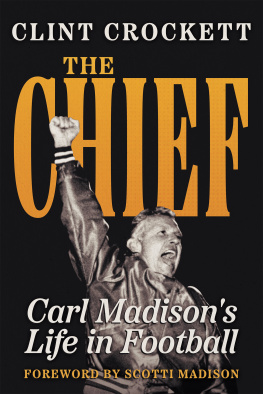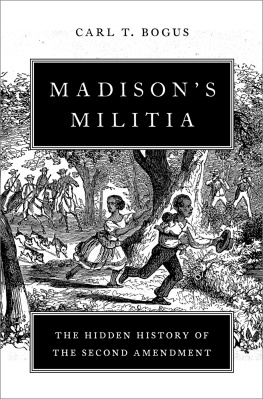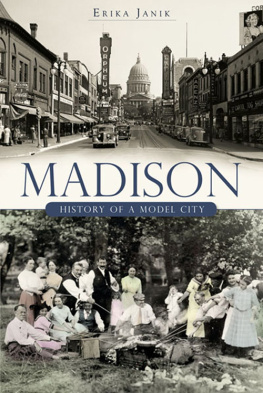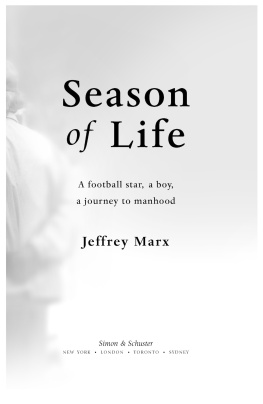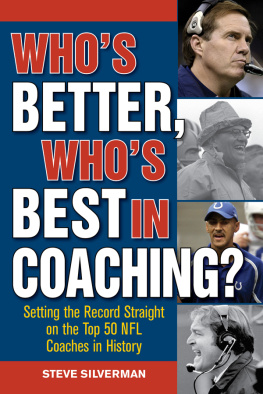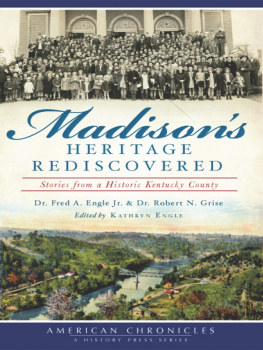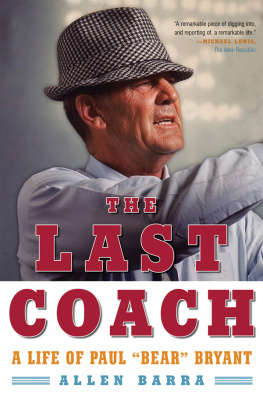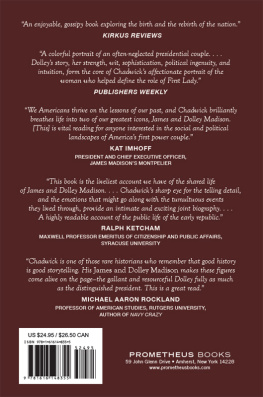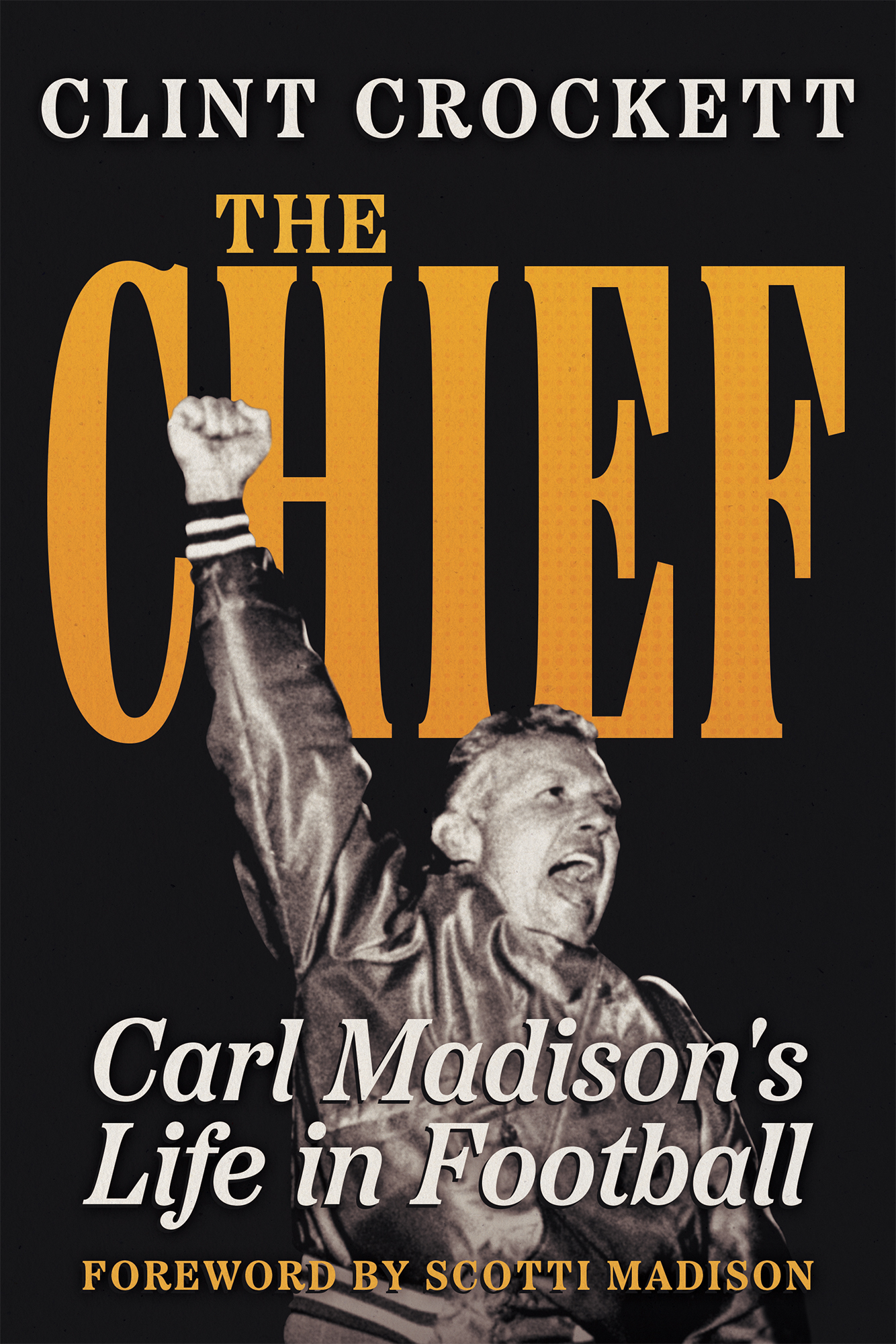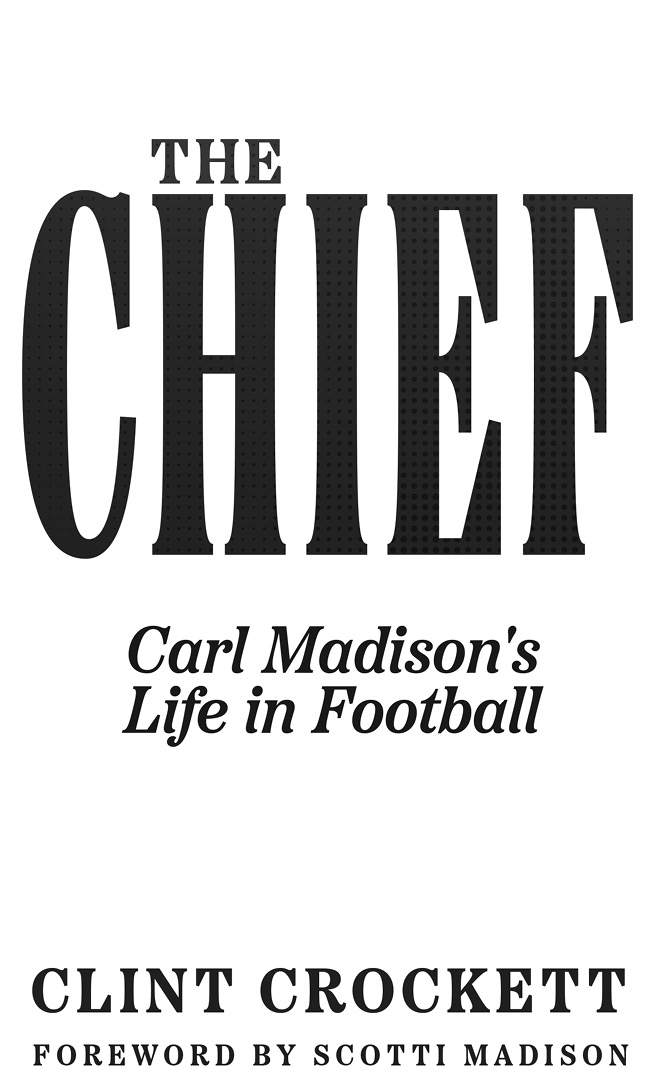Foreword
T hose of us fortunate enough to play a sport in high school or college will all agree that somewhere along the way, a coach had an impact on us. For a few, it could have been a bad experience playing for someone who stole the luster from their dreams. But the coaches the rest of us so fondly remember are the ones who challenged us to reach a higher level, to reach beyond our natural physical ability. They encouraged us to dedicate ourselves to a team cause outside of our own personal ambition.
Those coaches were usually tough, maybe even closer to downright mean, and exerted their will to shape us, mold us, and drive us to become overachieversnot only on the field of glory but taking that same desire to win into the field of life. They taught the exceptional qualities of sacrifice, hard work, respect, determination, and commitment that are critical to winning in the game of football, yet far more valuable beyond.
My uncle, the Chief Carl Madison, was that man for me and for hundreds of other benefactors over his half-century career. He grew up poor, and poverty closed many doors for him. Carl realized his only way out of Atmore, Alabama was through playing sports. He and his brother Charles were exceptional athletes early on, and by the ninth grade of their high school years, they had regular roles on the varsity football team.
Coach Madison also excelled in basketball and baseball in high school. If there was a season with a ball in it, the two brothers always tried their hand at it and were determined to conquer that sport.
Who could possibly write a story about this poor Native American boy born in Uriah, Alabama and later became one of the winningest high school football coaches in the state of Florida? It would take someone who personally played for him, but even more critically, it would need to be someone with a passion for the game who recognizes the Chiefs quality of dedication. Such a writer is Clint Crockett.
Clint grew up in Pensacola, Florida. At an early age, his father, James, nurtured his love for football. James is a lifelong fan who attended Ole Miss during the glory years of the program. He saw his school post a 3633 record with three unbeaten regular seasons and Southeastern Conference championships during his four years there. As a child, before his father began taking him to Ole Miss games in the late 1970s, Clint listened to The Ballad of Archie Who over and over on his record playera song about quarterback Archie Manning. During his first year of attending games, he witnessed the Rebels defeat Notre Dame at Mississippi Veterans Memorial Stadium in a season that would see the Fighting Irish go on to win the national championship. Without a doubt, Clint became hooked on football.
A move back to Pensacola, Florida from Oxford came just in time to experience the rise of Coach Carl Madisons fame. It was somewhere during his freshman year at Tate High School that Coach Madison challenged Clint to play at Tate. For those who never played under him, Coachs practices were probably mythical, and the stories of stick fighting and hanging off the back of the stadium would bounce from locker to locker in the hallways. Yet those who dared to enter into a Carl Madisons practice garnered satisfaction walking away from the death camp, especially after a loss. Clint, like the rest of us, survived and not only lived to tell about it, but he aspired to write about his coach and not be satisfied with just telling stories.
Clint was one of us, a chosen one, someone privileged to have played for the Chief. Thus, he felt the growing pains found in perfection through memorable practices like everyone else. In addition, his dedication to research as he wrote The Chief: Carl Madisons Life in Football is second to none, and Clints work allows former players the opportunity to reminisce about factual history. Clints delivery in the book is something each reader can treasure when traveling back in time to those glory days. I found it humbling to relive some of those close losses and quite exhilarating to read about a comeback victory. These events happened forty years ago, yet it seems like it just happened yesterday.
Coach Madison was tough on everyone but especially tough on those closest to him. He made it clear to everyone that he did not play favorites, so he went to the opposite extreme to demonstrate that was the case. In addition to me, both his sons, Mark and Sky, played for him. So did his cousin, Paul Madison. On the gridiron, we all received our fair share of verbal reprimandssome deservingand a few extra choice words beyond what the other players got.
I know firsthand because I was there as his quarterback as well as his nephew. I stood in line with my cousinsas did every other football playerto receive correction when we were told over and over to run it again.
Carl Madison is certainly quite memorable as my uncle and I love him dearly, yet he was legendary as my head football coach. He was bigger than life for everyone that he coached, and although small in frame and weight, no one was more intimidating to the high school kid. You did what he askedeven if it meant running through a brick wall. Clint helps you understand why this was the case in his book.
I know this book will bring back memories. Clint Crockett far exceeded my expectations with The Chief: Carl Madisons Life in Football . I was almost ready to change back into my shoulder pads, helmet, and uniform. If only they would fit.
Scotti Madison
Tate High Class of 1976
Preface
F rom a young age, I was exposed to my fathers voracious reading habit, and I later majored in English in college. Both of those experiences contributed greatly to my own love of books. After eventually reaching the point in my life where I knew I had to write, Carl Madison was the obvious choice as my subject.
Carl is a legendary figure in high school football who influenced many young men during his life. Some of those young men recognized the impact he had while they played for him. For many others, myself included, months and years passed before they truly gained an appreciation for the lessons he taught them and how their lives were impacted by the time they spent under his tutelage. In my case, it took the challenges of being a husband, a father, and having a career.
Interpreted through my firsthand experience with Coach Madison at Tate and interviews with others who know him, this book covers everything from his playing days at Atmore High School, Texas Tech, and Troy State to his coaching stops at Ernest Ward, Milton, Forest Park, Tate, Ernest Ward (again), Pine Forest, Westover, Pensacola High, Milton (again) and finally, Jackson Academy.
I was living in Tampa, Florida in June of 2005 when I called Coach Madison to inform him of my intention to write a book about him. We had not spoken in almost seventeen years. During our conversation, he told me that he would be coaching in the Fourth Annual Native All-Star Game in Lawrence, Kansas on July 1. Madison had coached in the inaugural affair and, with his nephew Scotti assisting him, won against Herman Boone of Remember the Titans fame.
Madison and Boone both had tremendous records as high school football coaches but were also chosen due to their Native American roots. Boones mother was Cherokee, Madisons Poarch Creek.
I immediately made plans to attend. I drove thirteen hundred miles to Lawrence, stopping in Birmingham and Memphis along the way, before arriving at the campus of Haskell Indian Nations University, the matchup location. Madison invited me into the locker room before the game, so I went straight there. Upon entering, the first voice I heard was Madisons as he addressed his team. Not wanting to disturb his pregame speech, I stood in the corner.

